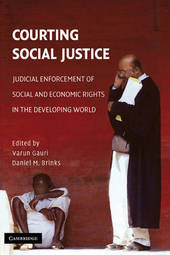
|
Courting Social Justice: Judicial Enforcement of Social and Economic Rights in the Developing World
Hardback
Main Details
| Title |
Courting Social Justice: Judicial Enforcement of Social and Economic Rights in the Developing World
|
| Authors and Contributors |
Edited by Varun Gauri
|
|
Edited by Daniel M. Brinks
|
| Physical Properties |
| Format:Hardback | | Pages:384 | | Dimensions(mm): Height 229,Width 152 |
|
| ISBN/Barcode |
9780521873765
|
| Classifications | Dewey:341.48 |
|---|
| Audience | | Professional & Vocational | |
|---|
| Illustrations |
13 Tables, unspecified; 9 Line drawings, unspecified
|
|
Publishing Details |
| Publisher |
Cambridge University Press
|
| Imprint |
Cambridge University Press
|
| Publication Date |
8 September 2008 |
| Publication Country |
United Kingdom
|
Description
This book is a five-country empirical study of the causes and consequences of social and economic rights litigation. Detailed studies of Brazil, India, Indonesia, Nigeria, and South Africa present systematic and nuanced accounts of court activity on social and economic rights in each country. The book develops new methodologies for analyzing the sources of and variation in social and economic rights litigation, explains why actors are now turning to the courts to enforce social and economic rights, measures the aggregate impact of litigation in each country, and assesses the relevance of the empirical findings for legal theory. This book argues that courts can advance social and economic rights under the right conditions precisely because they are never fully independent of political pressures.
Author Biography
VARUN GAURI is Senior Economist in the Development Research Group of the World Bank. His research focuses on politics and governance in the social sectors and aims to combine quantitative and qualitative methods in economics and social science research. His research has addressed HIV/AIDS policies in Brazil, South Africa, and Mozambique; basic immunization in Pakistan; the behavior of development NGOs in Bangladesh and Uganda; payment modalities for health care providers in Costa Rica and Nigeria; litigation for social and economic rights in developing countries; and the relationship between international human rights treaties and development outcomes. He is the author of School Choice in Chile: Two Decades of Educational Reform. He has published widely in development journals, including World Development, the Journal of Development Studies, Studies in Comparative International Development, World Bank Research Observer, and Health Policy and Planning. Since joining the World Bank in 1996, he has also worked on and led a variety of operational and analytic tasks, including project and program evaluations, investments in privately owned hospitals, health care decentralization, and public expenditure reviews. DANIEL M. BRINKS is Assistant Professor of Government at the University of Texas at Austin. He teaches in comparative politics and public law, with emphasis on comparative judicial politics and democracy in Latin America, and his research focuses on the role of the law and courts in supporting or deepening democracy. In addition to his research on the judicial response to police violence in Brazil, Argentina, and Uruguay, he has written on judicial independence, the role of informal norms in the legal order, and the use of law-based approaches to extend social and economic rights in developing countries. His research appears in journals such as Comparative Politics, Studies in Comparative International Development, Comparative Political Studies, and the Texas International Law Journal.
Reviews'Human rights are meaningless if they cannot be claimed. The formal court system is playing an increasingly important role in enforcing human rights claims in many countries, frequently with life-saving impacts, as part of the overarching institutional architecture and social mobilization for human rights accountability. Gauri and Brinks have produced a timely, distinctive and important comparative empirical analysis of prerequisites for effective legal claims to socio-economic rights, and their social policy implications. I have no doubt that this book will appeal to a wide readership of public policy makers, economists, social scientists and lawyers, transcending stale theoretical dichotomies between rights of different kinds and showing vividly what a cross-disciplinary field human rights has become.' Louise Arbour, UN Commissioner for Human Rights 'Judicial enforcement of social and economic rights has generated much theoretical controversy but little empirical work. Gauri and Brinks have taken a giant step forward with this methodologically innovative volume. The chapters fit together seamlessly, and provide a host of comparative and theoretical insights into the causes and consequences of judicial intervention in social and economic rights. The result is a major contribution to the literatures on rights, judicial power and social change, and the role of law in development.' Tom Ginsburg, University of Chicago Law School 'The book offers a comparative analysis of five countries, South Africa, Brazil, India, Nigeria and Indonesia. Each case is rich in empirical data, as well as relevant social and political factors ... This book is written to be accessible to both the serious empirical scholar of law and justice, as well as anyone interested in social justice and the protection of rights for disadvantaged populations. The ideas presented offer academics, scholars, and activists alike, the possibility of applying theoretical and empirical analysis to their own practices to further social justice ... Overall, this book successfully merges theoretical analysis regarding the courts as policy makers and their ability to protect rights with empirical data through the case studies.' Jamila Smith-Loud, University of Maryland
|